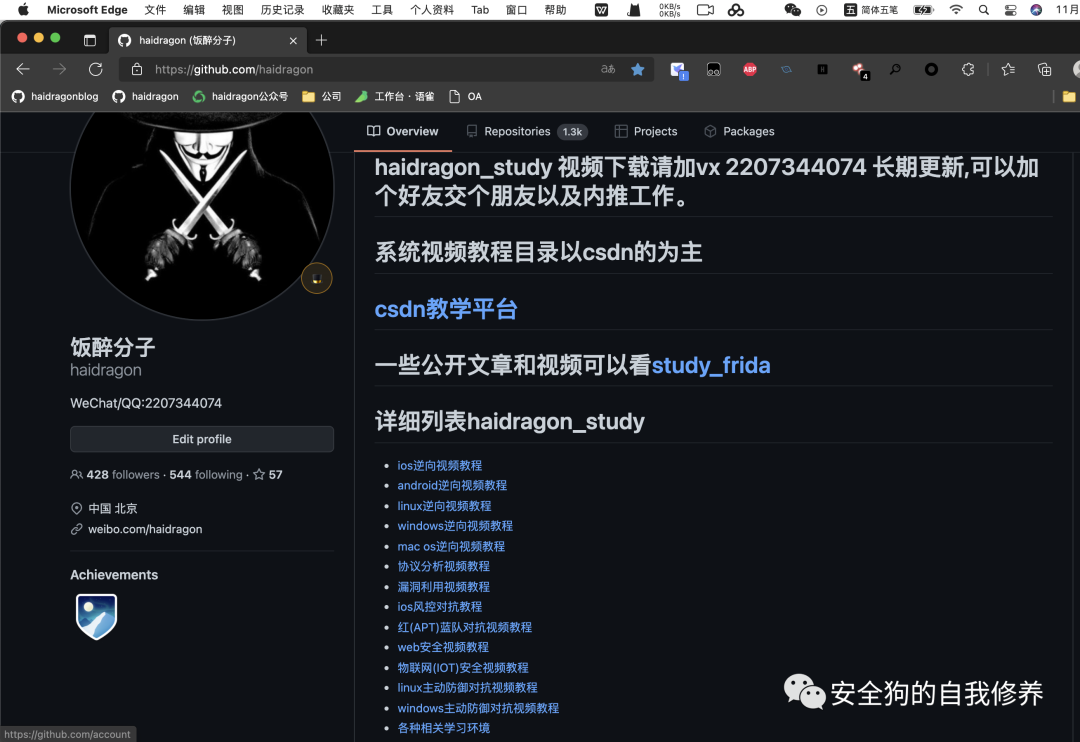
shellcode模拟运行工具之unicorn安装与使用
下载最新2.1版本源码 git clone https://github.com/unicorn-engine/unicorn.git编译mkdir buildcd buildcmake -G "U 2022-11-15 09:34:37 Author: 安全狗的自我修养(查看原文) 阅读量:42 收藏
下载最新2.1版本源码 git clone https://github.com/unicorn-engine/unicorn.git编译mkdir buildcd buildcmake -G "U 2022-11-15 09:34:37 Author: 安全狗的自我修养(查看原文) 阅读量:42 收藏
下载最新2.1版本源码
git clone https://github.com/unicorn-engine/unicorn.git编译
mkdir buildcd buildcmake -G "Unix Makefiles" ..cmake -G "Xcode" ..make -j6
模拟运行shellcode例子代码
/* Unicorn Emulator Engine *//* By Nguyen Anh Quynh & Dang Hoang Vu, 2015 *//* Sample code to trace code with Linux code with syscall */#include <unicorn/unicorn.h>#include <string.h>// code to be emulated#define X86_CODE32 \"\xeb\x19\x31\xc0\x31\xdb\x31\xd2\x31\xc9\xb0\x04\xb3\x01\x59\xb2\x05\xcd" \"\x80\x31\xc0\xb0\x01\x31\xdb\xcd\x80\xe8\xe2\xff\xff\xff\x68\x65\x6c\x6c" \"\x6f"#define X86_CODE32_SELF \"\xeb\x1c\x5a\x89\xd6\x8b\x02\x66\x3d\xca\x7d\x75\x06\x66\x05\x03\x03\x89" \"\x02\xfe\xc2\x3d\x41\x41\x41\x41\x75\xe9\xff\xe6\xe8\xdf\xff\xff\xff\x31" \"\xd2\x6a\x0b\x58\x99\x52\x68\x2f\x2f\x73\x68\x68\x2f\x62\x69\x6e\x89\xe3" \"\x52\x53\x89\xe1\xca\x7d\x41\x41\x41\x41\x41\x41\x41\x41"// memory address where emulation starts#define ADDRESS 0x1000000#define MIN(a, b) (a < b ? a : b)// callback for tracing instructionstatic void hook_code(uc_engine *uc, uint64_t address, uint32_t size,void *user_data){int r_eip;uint8_t tmp[16];printf("Tracing instruction at 0x%" PRIx64 ", instruction size = 0x%x\n",address, size);uc_reg_read(uc, UC_X86_REG_EIP, &r_eip);printf("*** EIP = %x ***: ", r_eip);size = MIN(sizeof(tmp), size);if (!uc_mem_read(uc, address, tmp, size)) {uint32_t i;for (i = 0; i < size; i++) {printf("%x ", tmp[i]);}printf("\n");}}// callback for handling interrupt// ref: http://syscalls.kernelgrok.com/static void hook_intr(uc_engine *uc, uint32_t intno, void *user_data){int32_t r_eax, r_ecx, r_eip;uint32_t r_edx, size;unsigned char buffer[256];// only handle Linux syscallif (intno != 0x80)return;uc_reg_read(uc, UC_X86_REG_EAX, &r_eax);uc_reg_read(uc, UC_X86_REG_EIP, &r_eip);switch (r_eax) {default:printf(">>> 0x%x: interrupt 0x%x, EAX = 0x%x\n", r_eip, intno, r_eax);break;case 1: // sys_exitprintf(">>> 0x%x: interrupt 0x%x, SYS_EXIT. quit!\n\n", r_eip, intno);uc_emu_stop(uc);break;case 4: // sys_write// ECX = buffer addressuc_reg_read(uc, UC_X86_REG_ECX, &r_ecx);// EDX = buffer sizeuc_reg_read(uc, UC_X86_REG_EDX, &r_edx);// read the buffer insize = MIN(sizeof(buffer) - 1, r_edx);if (!uc_mem_read(uc, r_ecx, buffer, size)) {buffer[size] = '\0';printf(">>> 0x%x: interrupt 0x%x, SYS_WRITE. buffer = 0x%x, size = ""%u, content = '%s'\n",r_eip, intno, r_ecx, r_edx, buffer);} else {printf(">>> 0x%x: interrupt 0x%x, SYS_WRITE. buffer = 0x%x, size = ""%u (cannot get content)\n",r_eip, intno, r_ecx, r_edx);}break;}}static void test_i386(void){uc_engine *uc;uc_err err;uc_hook trace1, trace2;int r_esp = ADDRESS + 0x200000; // ESP registerprintf("Emulate i386 code\n");// Initialize emulator in X86-32bit modeerr = uc_open(UC_ARCH_X86, UC_MODE_32, &uc);if (err) {printf("Failed on uc_open() with error returned: %u\n", err);return;}// map 2MB memory for this emulationuc_mem_map(uc, ADDRESS, 2 * 1024 * 1024, UC_PROT_ALL);// write machine code to be emulated to memoryif (uc_mem_write(uc, ADDRESS, X86_CODE32_SELF,sizeof(X86_CODE32_SELF) - 1)) {printf("Failed to write emulation code to memory, quit!\n");return;}// initialize machine registersuc_reg_write(uc, UC_X86_REG_ESP, &r_esp);// tracing all instructions by having @begin > @enduc_hook_add(uc, &trace1, UC_HOOK_CODE, hook_code, NULL, 1, 0);// handle interrupt ourselfuc_hook_add(uc, &trace2, UC_HOOK_INTR, hook_intr, NULL, 1, 0);printf("\n>>> Start tracing this Linux code\n");// emulate machine code in infinite time// err = uc_emu_start(uc, ADDRESS, ADDRESS + sizeof(X86_CODE32_SELF), 0,// 12); <--- emulate only 12 instructionserr =uc_emu_start(uc, ADDRESS, ADDRESS + sizeof(X86_CODE32_SELF) - 1, 0, 0);if (err) {printf("Failed on uc_emu_start() with error returned %u: %s\n", err,uc_strerror(err));}printf("\n>>> Emulation done.\n");uc_close(uc);}int main(int argc, char **argv, char **envp){if (argc == 2) {if (!strcmp(argv[1], "-32")) {test_i386();} else if (!strcmp(argv[1], "-h")) {printf("Syntax: %s <-32|-64>\n", argv[0]);}} else {test_i386();}return 0;}
更多其它详细教程可以联系作者。
目录
# unicorn源码分析与使用视频教程## 基础* 1.课程介绍* 2.unicorn源码编译* 3.unicorn简单使用与调试* 4.unicorn 源码框架了解* 5.实现一个最简单的my_qemu(kvm)* 6.shellcode 指令追踪使用* 7.shellcode 指令追踪源码分析* 8.使用中断事件hook源码分析 (syscall)* 9.使用中断事件hook源码分析(arm syscall)* 10.内存操作事件hook(读写执行)* 11.内存操作事件hook源码分析* 12.异常事件使用与源码分析* 13.再谈unicorn(框架定位与缺陷)## x86架构中使用* 14.模拟单个参数函数与获取返回值(x86_64构架)* 15.模拟多个参数函数(x86_64构架)* 16.模拟获取全局变量函数(x86_64构架)* 17.外部符合libc库函数调用模拟(x86_64构架)* 18.模拟多个函数调用链(x86_64构架)### 常用算法模拟* 19.模拟base64编码(x86_64构架)* 20.aes算法模拟(x86_64构架)* 21.des算法模拟(x86_64构架)* 22.rc4算法模拟(x86_64构架)* 23.其它算法模拟思路(x86_64构架)## arm架构中使用* 24.模拟单个参数函数与获取返回值(arm64构架)* 25.模拟多个参数函数(arm64构架)* 26.模拟获取全局变量函数(arm64构架)* 27.arm构架中的算法模拟(arm64构架)* 28.android中模拟与JNI交互(arm64构架)* 29.JNI模拟call java函数(arm64构架)## 完善unicorn* 30.unicorn ELF文件模拟* 31.unicorn 其它可执行文件* 32.unicorn调试器介绍## ollvm混淆* 33.unicorn结合capstone使用* 34.生成CFG(控制流程图)* 35.ollvm反混淆思路
其它学习教程。
文章来源: http://mp.weixin.qq.com/s?__biz=MzkwOTE5MDY5NA==&mid=2247486518&idx=1&sn=4e0b5ae72b4a4b59092ebf8bbccd4f32&chksm=c13f3f7ff648b6699aef62ce245c5a0107b2e869f0da603755c531bbbc32fc4604f4ce6a0b9a#rd
如有侵权请联系:admin#unsafe.sh
如有侵权请联系:admin#unsafe.sh